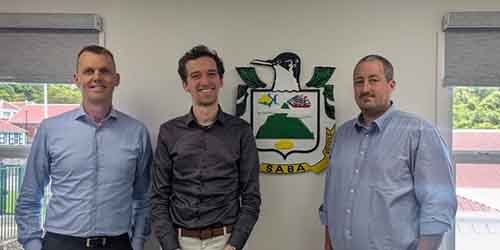This week, representatives from the Amsterdam Bureau for Economics visited various organizations and businesses on Saba as part of a quick scan requested by the Saba Government. With support from the Ministry of Economic Affairs, the goal of this scan is to identify key drivers behind the island’s high cost of living.

Over recent days, researchers have engaged with several stakeholders critical to Saba’s importation processes. Their visit began on Monday, October 28, with a meeting with Commissioner of Finance and Economic Affairs Bruce Zagers.
The team met with a range of stakeholders, including supermarket and hardware store owners, customs officials, brokers, the business association, transporters, and logistics agents.
As part of the research, they conducted a comprehensive analysis of the factors influencing the costs of imported goods and services. This includes examining supply chain elements, such as supplier pricing and shipping rates, to assess how these affect retail prices on the island. The final report will offer both short-term and long-term recommendations for the Public Entity Saba, the Dutch Government, and the private sector to help lower the cost of living.
This quick scan is part of the Saba Package Agreement (2023–2027), in which the Public Entity Saba and the Dutch government committed to better understanding and addressing the high costs of living and doing business on the island. The agreement emphasizes exploring the causes of rising costs, particularly those tied to imported goods.
“This is an important step in addressing the increasing cost of living that we have seen in recent years. This research will help us work towards structural solutions that can hopefully reduce costs, especially in the business sector,” stated Commissioner Zagers.
The final report will be published and made publicly available by the end of the year.
GIS

 Saba News News and Information from Saba Island, Dutch Caribbean
Saba News News and Information from Saba Island, Dutch Caribbean
